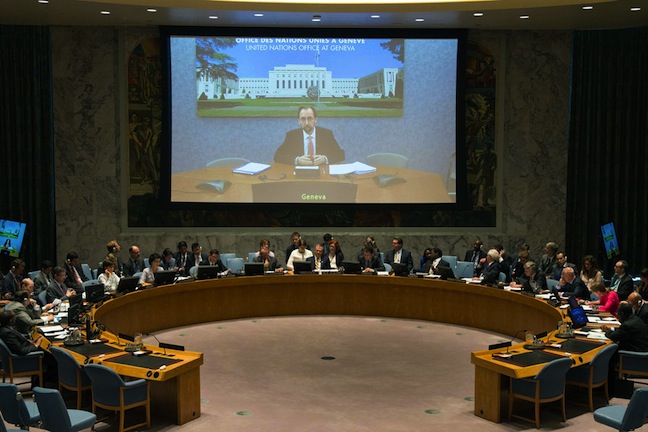More than 8,000 Bosnian Muslim males were slaughtered in Srebrenica, a small mining town in north-east region of Bosnia, by Bosnian Serb forces during the summer of 1995 and is the result of what is now known as the Srebrenica Genocide. With evidence of more than found 6,000 graves showing the magnitude of the killings, the large investigations, testimonies from survivors and more, the massacre which is still the largest such on European soil since the United Nations was founded, the occurrence was never noted as a genocide in the eyes of United Nations leaders back then. That painted a blatant image of the lack of sincere political backbone to acknowledge what had occurred, leaving long-term scarring effects of the genocide that were not only endured by the Srebrenica community but by the entire country. Today’s veto shows that an abstract war still goes on.
The United Kingdom-led approach, with “interested states,” primarily Bosnia and Herzegovina and Serbia, drafted the resolution reaffirming the Charter of the United Nations, the Universal Declaration of
Human Rights, and the Convention on the Prevention and Punishment of the Crime. The proposal reminded States that they bear the primary responsibility to protect civilians and that they must respect and ensure the human rights of all individuals within their territory and also the Security Council that its duty is to the maintenance of international peace and security with the expressing of a strong determination to prevent genocide. Ambassador and Deputy Permanent Representative of the UK Mission to the UN, Peter Wilson, said at the UN today, “The United Kingdom has been very proud to hold the pen on this resolution. It is an extremely important resolution that sits on the 20th anniversary of the tragic events in Srebrenica. We want to promote reconciliation which can only happen when people recognize the facts about the past, and also prevent this sort of things ever happening in the future.”
Since the International Criminal Tribunal for the former Yugoslavia (ICTY) and the International Court of Justice (ICJ) strongly condemned the 1995 acts both in Srebrenica as well as during the entire Bosnia and Herzegovina conflict as genocide, therefore the adoption of the proposal would have been a great advancement in reconciliation. The attempt needed at least 10 votes to pass, however Angola, China, Nigeria and Venezuela abstained while the [regular] Russian Federation voted against. When one of the UNSC's five permanent members votes negatively on any resolution, the result is rejection of the proposal and it cannot be adopted, which is what occurred today. Had success been gained, the initiative could be seen as a new strategy in the nudging of Serb political actors in Bosnia and Serbia, motivating them toward somewhat of an acknowledgement of their macabre conduct. It would have been an even further agreement from the UN that what occurred in Srebrenica was in fact genocide the
The blasting, blazing cannons fell silent 20 years ago with the signing of the Dayton Peace Accords, a 1995 agreement formally signed in Paris to put an end to the 3.5-year-long war in Bosnia when thousands of people were displaced, families and communities were devastated and the entire land was destroyed. And on July 1, during a commemorative event in New York, Secretary-General, Ban Ki-Moon marked the 20th year of remembrance of the lives lost by somberly saying, “The United Nations, which was founded to prevent such crimes from recurring, failed in its responsibilities to protect the lives of innocent civilians seeking protection from the conflict and violence around them. The UN Secretariat, the Security Council and Member States share the blame.” Ban stated, in a solemn voice, that the carnage, “will forever weigh on the collective conscience of the international community.”
Even though commander of the Serb Army, Ratko Mladić, is currently on trial for genocide and crimes against humanity at the ICTY families of the victims are still in a state of shock and forced limbo while they continue to endure the pain of the lack of acknowledgement, plus meager amounts of justice, for what occurred back then. The constant fabrication of fear and reasons for hatred is still a looming specter over the country. “Lessons learned from those “unspeakable” days still reverberate throughout the United Nations,” said UN Deputy Secretary-General Jan Eliasson who urged better efforts aimed at prevention and greater cohesion among the international community as it confronts a growing litany of crimes against humanity perpetrated around the world.
UN High Commissioner for Human Rights, Zeid Ra'ad Al Hussein joined the event via video-conference urging better efforts aimed at prevention and greater cohesion among the international community as it confronts a growing litany of crimes against humanity perpetrated around the world. “If the UN is to make good on its commitment to protect civilians, it must be resolute, undivided and clear about its intention. So long as there is no respect for the UN, it will be likely that further massacres will be perpetrated,” Mr. Zeid told Council members.












